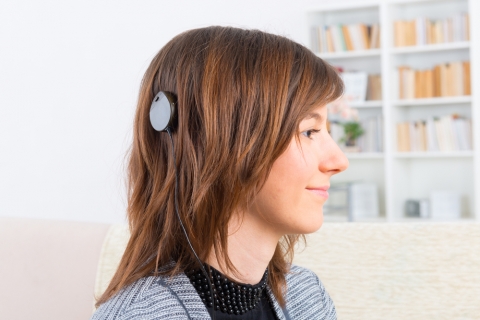
Blog Synopsis:
- According to the National Institute on Deafness and Other Communication Disorders (NIDCD), more than 325,000 people throughout the world have a cochlear implant (Dec. 2012).
- To be considered for this highly advanced device, patients must first undergo a number of tests and be evaluated by a physician at AOC.
- In this blog, the ENT specialists at AOC explain what a cochlear implant is, how it works, and who is a candidate for them.
Before understanding how a cochlear implant works, you must first understand what a cochlear implant is. Contrary to popular belief, a cochlear implant is not a hearing aid that amplifies sound for people who are hard of hearing. This unique device is surgically implanted into the ear to help those who are profoundly deaf or severely hard-of-hearing have a sense of sound. These two technologies work in very different ways!
We’ll elaborate on the process: hearing aids make sounds louder so that damaged ears can hear them. Cochlear implants bypass damaged areas of the ear to transport sound directly to the auditory nerve; once the auditory nerve is stimulated, it sends a signal to the brain telling it to recognize the sound being emitted.
A cochlear implant is made up of various small parts such as a microphone, speech processor, transmitter, receiver (stimulator), and an electrode array. All of these parts work together to:
- Pick up sound from an environment
- Select and systematically arrange the sound
- Convert signals from processor to electrical impulses
- Transport impulses to regions of the auditory nerve
Patients must also understand that “hearing” with a cochlear implant is very different from what most people consider “normal” hearing. Also, cochlear implants cannot technically “restore” normal hearing. Instead, these implants pick up sounds from the environment and help patients better understand speech and interpret warning signals. Patients who receive a cochlear implant must go through a type of therapy to re-learn sound.
Not all patients will experience successful or desirable results with a cochlear implant, so it’s important to talk to an ENT physician about the device. Lifestyle changes may develop over time following the implantation. To learn more about cochlear implants, call AOC today to schedule an appointment with one of our physicians! We’d be happy to walk you through the process and answer any questions you may have about the device. Call today!
Arizona Otolaryngology Consultants (AOC) is a comprehensive ENT clinic that provides care for all diseases of the ears, nose, throat, and sinuses. The physicians at AOC have the highest level of training and expertise in ENT care and ENT subspecialty care, which includes the management of pediatric airway, cancer, skull base surgery, advanced head and neck surgical and reconstructive procedures, craniofacial surgery and more. Call 602-264-4834 to request an appointment today!
The advice and information contained in this article is for educational purposes only and is not intended to replace or counter a physician’s advice or judgment. Please always consult your physician before taking any advice learned here or in any other educational medical material.
